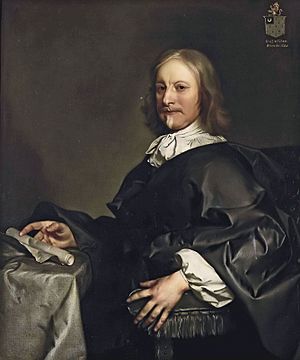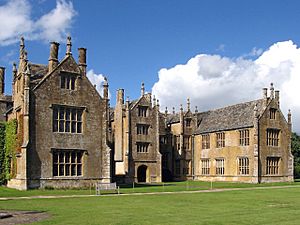William Strode (of Barrington) facts for kids
Colonel William Strode, Jr. (born January 11, 1589, in Shepton Mallet, Somerset; died December 20, 1666, at Barrington Court, Somerset) was an important English leader. He was known as William Strode of Barrington to tell him apart from others with the same name. He was a Member of Parliament for Ilchester and a military officer who supported the Parliament during the English Civil War.
William Strode was a very successful cloth merchant. He bought several large properties in his home county of Somerset. He was also known for helping his local community and for standing against King Charles I and King Charles II in politics and war.
Contents
Biography
Early Life and Family
William Strode was the youngest son of William Strode, Sr. and Elizabeth Upton. His family had lived in Somerset for a long time and were connected to other important families there.
Like his father, William became a successful clothier, which means he made and sold cloth. He spent some of his younger years in Spain, where his father worked. In 1621, he married Joan Barnard, who inherited money and property from her family. In 1625, William bought Barrington Court. He, his son, and his grandson, all named William, lived there until 1745. In 1635, a famous artist named Gilbert Soest painted his portrait, which you can still see today. In 1640, he became a Member of Parliament for Ilchester.
The English Civil War
When the English Civil War began, William Strode was against King Charles I. He supported the Parliament. In 1642, he became one of the Parliament's main representatives in Somerset.
The King's supporters, called Royalists, tried to gather men and weapons in Somerset. The leader of the Royalists, the Marquess of Hertford, sent Sir Ralph Hopton and his horsemen to Shepton Mallet to announce the King's orders.
In July 1642, Sir Ralph Hopton arrived in Shepton Mallet. William Strode bravely rode out to meet him. Strode demanded to know why the Royalists were there with so many weapons. Sir Ralph tried to arrest Strode, and a fight broke out. Strode was knocked off his horse, but his servants protected him.
Soon, many local people who supported Parliament started gathering to help Strode. When Sir Ralph Hopton heard that more people were coming to support Strode, he and his Royalist horsemen quickly left Shepton Mallet.
After this event, William Strode took charge of the local soldiers who supported Parliament. These soldiers later became a full-time regiment, and Strode became their colonel.
In August 1642, there was a small fight near Marshall’s Elm in Somerset. Royalist horsemen fought against about 600 Parliament soldiers led by Colonel Strode. The Royalists attacked them, and some soldiers were hurt or died.
In 1646, Strode was again elected to Parliament for Ilchester. He was a supporter of the Presbyterian group in Parliament. However, he was later removed from Parliament in 1648 during a time of political change.
Later Years
After King Charles II returned to power in 1661, William Strode was briefly put in prison. He had to agree to follow the King's orders. He passed away in 1666 at the age of 77 and was buried at the Church of St Mary the Virgin in Barrington.
Legacy
Strode's Descendants
- William Strode's oldest son, William Strode III (1622-1694), also became a Member of Parliament for Ilchester in 1679. He supported the Duke of Monmouth, another important leader.
- Another son, Edward Strode (around 1629–1703), built a famous house called the Merchant's House in Shepton Mallet. He also supported the Duke of Monmouth.
Places Named After Strode
- In West Cranmore, there is a charming stone pub called "The Strode Arms." It has the Strode family's coat of arms displayed outside.
- The Strode Theatre (built in 1963) in Street, Somerset, England, is named in his honor.
 | Madam C. J. Walker |
 | Janet Emerson Bashen |
 | Annie Turnbo Malone |
 | Maggie L. Walker |



